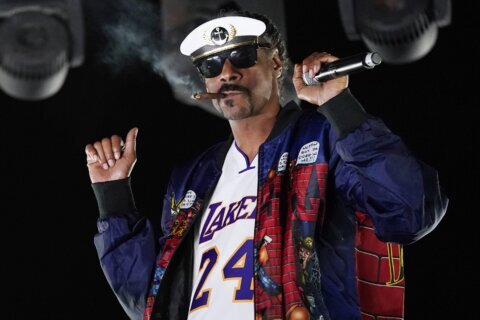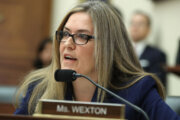INDIANAPOLIS (AP) — A dry erase board stuck to the wall behind the door to Mark Emmert’s office at NCAA headquarters has three columns drawn on it. At the top of the list on the left, “Academic Success” is handwritten in green marker. The middle column is for “Health & Well Being.” On the right is “Fairness.”
Jotted down under each header are policy goals and initiatives the NCAA has worked to achieve during Emmert’s 11-year tenure leading the nation’s largest governing body for college sports.
The ones written in red marker have something to show for them. The ones written in orange are works in progress. The board is mostly covered in red.
Ask Emmert about the NCAA’s accomplishments under his watc and he will point to that wall.
“I’m incredibly proud of my work record,” he said during a recent 45-minute interview with The Associated Press.
Others are not as impressed.
While leading the NCAA through a period of unprecedented change, Emmert has faced relentless criticism. For those outside college sports skeptically peering in, he has become the easiest of targets, the face of an unpopular and seemingly ineffective bureaucracy.
“Don’t you think it is time to call your leadership of the organization into question?” Sen. Marsha Blackburn (R-Tenn.) asked Emmert during a June hearing in Washington.
Many within college sports have been asking the same question, especially in 2021. The NCAA has been hammered over gender-equity issues at its showcase basketball tournaments, saw its authority undercut by a stinging antitrust ruling from the Supreme Court and was forced into a hands off solution allowing name, image and likeness compensation for college athletes.
“How is this guy still employed?” a high-ranking college sports administrator said in a text message to AP last month, one day after Emmert publicly endorsed reducing the NCAA’s role in running college sports.
That person was among about two dozen former and current college sports administrators AP interviewed for this story. Almost all declined to be interviewed on the record while a few insisted on anonymity because they did not believe being publicly critical of Emmert was helpful at a time when NCAA is getting pummeled.
If the 68-year-old Emmert is so unpopular, why is he still the NCAA president? Why did he receive a contract extension through 2025 in April in a unanimous vote by the NCAA’s Board of Governors?
“We have confidence in Mark’s continuing leadership of the NCAA,” board chairman Jack DeGioia, the president of Georgetown, told the AP a few weeks before Emmert’s contract extension was announced.
Emmert has reason to feel proud about how conditions have changed for the more than 450,000 college athletes in the NCAA’s three divisions during the last decade.
Athletes can now receive cost-of-attendance stipends, guaranteed four-year scholarships and better medical coverage from their schools. Loosened guidelines make it easier for athletes to switch schools. More restrictive rules force coaches to respect players’ time now more than ever.
But the progress has been obscured. The NCAA has been hammered in court and the losses have cost the association hundreds of millions in damages and legal fees. Its grip on all things seems looser than ever — a feeling fed by Emmert himself.
Emmert started his tenure aggressively pushing for athlete benefits, but quickly learned the limits of his power when he was rebuked by membership. Early in his tenure he went outside NCAA structure and process to punish Penn State for the Jerry Sandusky scandal, an overreach that ended up hurting the association’s credibility when some of the sanctions were rolled back.
Emmert has been among those celebrating the “modernization” of NCAA rules that has led to college athletes becoming paid endorsers and entrepreneurs this year.
But the changes came under pressure from state lawmakers and years after the NCAA could have gotten out in front of the issue. That has left Emmert and the NCAA pleading for help from federal lawmakers that may not come from Congress.
Emmert said he is undaunted by criticism. While his critics complain he can be overly concerned with public perception, his willingness to be the association’s heat shield helps explain his longevity.
To some, the focus on Emmert is misplaced. The problem is not the leader, but a structure that makes the NCAA — a voluntary organization with more than 1,100 member schools — so difficult to lead.
“I’m not a Mark Emmert fan, OK?” Former Big Eight and Big 12 Commissioner Chuck Neinas said. “But the point of the fact is: look what he’s got to work with.”
Karl Benson worked with five NCAA presidents from Byers to Emmert during his career as a conference commissioner. He said Division I has become ungovernable — a viewpoint surely to be front and center for the group working on overhauling the NCAA’s constitution.
“The NCAA and Division I college sports has become a dysfunctional organization with 350 universities with a huge disparity in financial resources —- with NCAA rules trying to fit them into a one-size-fits-all system,” Benson said. “Impossible for one man to manage the system.”
Maybe the question for Emmert about his job should be: Why does he still want it?
Emmert said he hears that a lot from his wife, DeLaine, but he simply believes there is more to be done for college athletes and he can still “add value.”
“I understand the pressures that are on schools right now, not just the athletic departments, the schools right now. It’s a tough time. It’s a very difficult time,” he said. “And I understand also the political milieu where everybody is at each other’s throats. We’re in a moment in time where you only get attention if you’re outrageous and you’re pissed off about something. And that’s become our form of discourse. I think that’s unfortunate. I think it doesn’t help us as a society. Certainly doesn’t help us as an athletic association.”
__
Follow Ralph D. Russo at https://twitter.com/ralphDrussoAP and listen at http://APpodcasts.com/
___
More AP college football: https://apnews.com/Collegefootball and https://twitter.com/AP_Top25
Copyright © 2024 The Associated Press. All rights reserved. This material may not be published, broadcast, written or redistributed.






